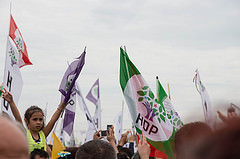ISTANBUL – Hopes and fears are plentiful in Kurdish and left-wing politics in Turkey ahead of the elections on Sunday. The Peoples Democratic Party (HDP), the left-wing party focused on the Kurdish issue, has a unique chance of obtaining the required ten per cent of votes to secure some seventy seats in parliament in the Turkish general elections on the 7th of June. This is perhaps the most politically intense multi-party election in the history of the state.
The buildup to the elections has generated intensified discussion about the Kurdish struggle and the state of the peace process between the outlawed Kurdistan Workers Party’s (PKK), jailed PKK leader Abdullah Öcalan, and President Erdogan’s ruling party, the Justice and Development Party (AKP).
The PKK engaged in armed conflict with the Turkish state from 1984 up until 2013 and is still considered a terrorist organization by both the European Union and the United States. The terrorist label, however, is increasingly questioned, following PKK’s entry into the war against ISIS in northern Syria. The motivation to the Kurdish struggle is to achieve self-determination and cultural and political rights for the oppressed Kurdish minority in Turkey. Kurds make up as much as a quarter of Turkey’s population. The PKK began as a Marxist-Leninist organization, but has since moved on to “Democratic Confederalism”, an anarchist inspired political platform that no longer calls for a Kurdish nation-state.
The peace process with the PKK began in 2013 after calls from Öcalan for the PKK to cease hostilities. Although negotiations with the AKP appear to be a fruitless endeavor, some progress has been made. Many skeptics claim that this progress is illusory, given Erdogan and the AKP’s grip on Turkey, and therefore any apparent gains are simply institutionalized means to appease tension ahead of the elections. After all, the basis of the Kurdish struggle has not changed.
Tugce Öztürk, a resident of Istanbul’s Okmeydani district, explains: “The Turks have no right to govern us. They lost all legitimate claims long ago. We weren’t allowed to speak our language. It is enough to be Kurdish to have the police follow you around. I am from Diyarbakir and many of my friends were beaten by the police and imprisoned.”
Öztürk stresses that she never supported the violent methods such as attacks on civilians and suicide bombings of the PKK, but that she has also never been as hopeful for change as with the current rise of HDP. Given the pre-election momentum and the HDP’s incredibly high stakes, the prospect of the HDP failing to reach the ten per cent threshold is terrifying.
Öztürk also fears that an HDP failure failure would put the peace process at risk. If the HDP does not enter parliament in June, she believes there will be riots and clashes in Diyarbakir, the unofficial capital of the part of Kurdistan that lies within the borders of the Turkish state.
Others are more cynical. A university student from Istanbul who wishes to remain anonymous contests that the HDP does not actually matter. He claims that the HDP party is merely one instrument, and perhaps not the most important or effective one, in the strategic repertoire of the PKK. It all comes down to Qandil, the university student contends. Qandil is a mountainous region in northern Iraq where the military headquarters of the PKK lies. Qandil hosts the PKK command, several thousand militants, and their supplies in relative safety in the inaccessible mountains.
Regardless of the peace process, the next few weeks are likely to define the future of the Kurdish struggle. Many argue that the success or otherwise of the HDP will also set the course of the Turkish left for years to come. An anonymous supporter of the banned Marxist-Leninist organization the Revolutionary People’s Liberation Party-Front (DHKP-C), one of few left-wing organizations that has not been united under the HDP umbrella, states her concern that the HDP will simply use its seats in parliament as a bargaining chip in the peace process and leave the Turkish left stranded without representation in the unlikely event of an autonomous Kurdistan.
Another concern that she articulates is that of electoral fraud; she argues that anything could happen and does not trust president Erdoğan and the AKP to play by the rules of democracy. “With this corrupted fascist state you never know what they might do in order to stay in power,” she says.
If HDP obtains the ten per cent it needs, it is at least theoretically possible that the HDP might hold the balance of power in parliament. In this scenario, the HDP’s support would be required should (read: when) the AKP desires to rule for another term. The more likely scenario is that AKP will not receive the qualified majority the party needs to change the constitution. One of Erdogan’s projects is to do just this in order to move Turkey’s political system towards presidentialism.
However, there is another possibility – that the AKP government ask the Nationalist Movement Party (MHP) and its neo-fascist youth organization, the Greywolves, to prop up Erdogan’s government. The MHP are the sworn enemies of the PKK, and it entirely likely that a government propped up by the MHP and the Greywolves would be inclined to end the peace process.
The last few months have been comparatively calm in Turkey considering the Gezi Park events are fresh in the country’s collective memory. Although many HDP offices have been bombed, neither May 1st nor the one-year anniversary of the Soma mining disaster led to any major unrest or disturbances. Some argue that the coming elections present a glimmer of hope to those part of the Gezi generation. If these hopes are shattered, tensions are likely to escalate — and not isolated around the Kurdish question.
 Log in
Log in









